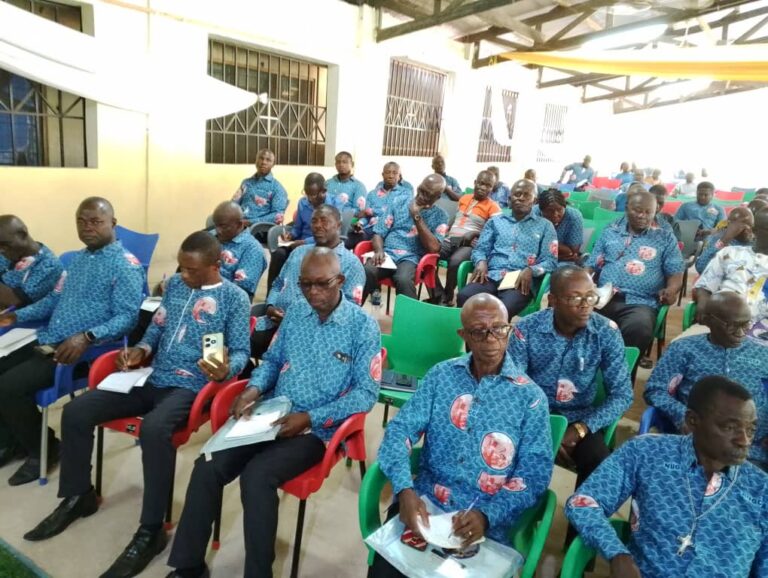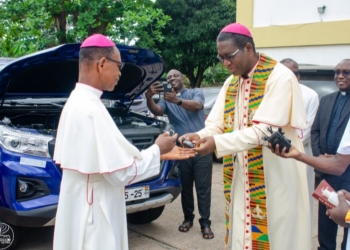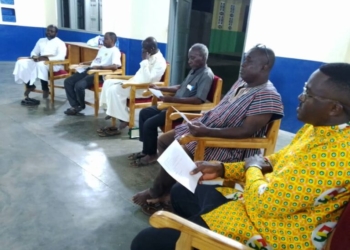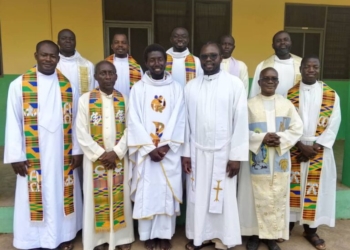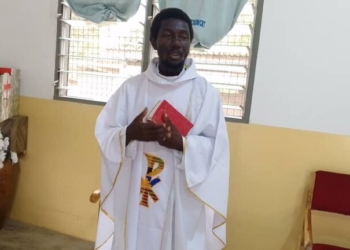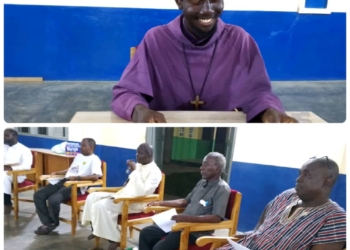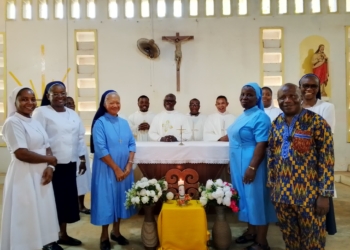This was made in a Keynote address delivered on behalf of Bishop Atuahene by Most Rev. John Alphonse Asiedu SVD, Bishop of Donkorkrom Apostolic Vicariate in the Kwahu Afram Plains, during the Opening Ceremony of the 2025 National Delegates Conference of the National Union of Ghana Catholic Catechists Association (NUGCCA) held at the Alfons Merten’s Centre, Donkorkrom.
Reflecting on the Theme for the Conference: “Our Call to Care for the Environment: A Divinely Assigned Responsibility,” which incidentally is the same for this year’s Catechetical Week celebration, Bishop Atuahene called on all Catechists and other faithful, to undertake the care of the environment as a divine mandate, adding that each person’s or group of persons’ response to this call is dictated by his or her role in the Church.
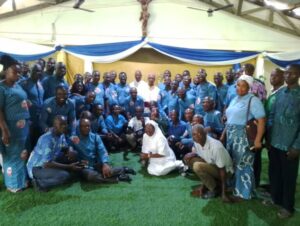
“We, as people of faith, acknowledge the earth as our heritage, which has been entrusted to us by God Himself as stated in the two creation stories of Genesis 1 (v. 26-31) and 2 (v.7-15). Our forebears made use of this heritage for their livelihood and handed it over to the present generation for our use. Our belief in the origin of this earth on which we live is rooted in the Holy Scripture, which is the foundation of all doctrine and its expression in worship,” he maintained.
The Chief Shepherd further upheld that the first account of creation found in Genesis 1, presents human beings as having been made in the image and likeness of God and given the charge to have authority over all the created order: “the trees and vegetation, the various waterbodies, including the sea, the lagoons, lakes and the rivers. The animals, on the land, the birds that fly in the skies, and the fish that swim in the waters were all placed under the dominion of man”.
He highlighted some aspects of Ghanaian culture that uphold the care of natural resources, some of which date as far back as before the advent of Christianity, including prohibitions of certain activities within particular periods and the institution of sacred rituals.
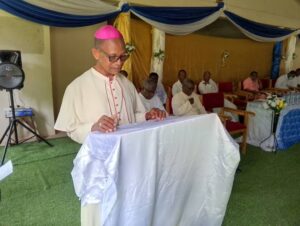
Some of the examples were a month-long ban placed on fishing in the lagoon before the celebration of Homowo and Bakatue, among the Gas of Accra and the Fantes of Elmina, respectively.
He explained that as part of the festivals, the traditional priest casts the net to catch fish, and usually, the volume of fish caught in the net signifies the level of harvest for the year. A good catch by the traditional priest is interpreted as a bumper harvest (good fishing season) and a poor catch as an indication of a poor fishing season, he added.
Applying scientific analysis to this ritual, the SVD Bishop opined that the one month ‘rest’ given to the lagoon enables the fish to breed and multiply. This, he added, is a way of allowing a natural way of rejuvenation of fish stock in the waterbodies.
Similar traditions apply to farming communities, where sacred groves are created to protect important plant species, some of which are important medicinal plants.
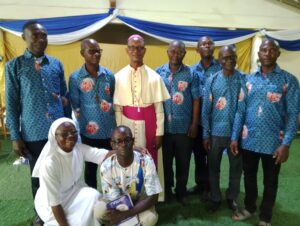
He drew parallels between local practices and biblical tradition, stating that just like in the local cultures where traditionalists devised means and ways of protecting the earth, so too, in the Bible, God made rules for the sabbatical year when the land is not tilled to enable it to recover its lost fertility.
The Goaso prelate further expounded on two major means by which the Church acknowledges the various gifts God gave humankind in nature: Doctrinal Tradition and the Church’s Liturgical Tradition.
Touching on Doctrinal Tradition, he underscored that the Church has a whole body of teachings on the environment, which are rooted in Sacred Scripture, and it recognizes the earth and all that exists as sacred and must be handled as such. He added that the biblical foundation of the whole nature as originating from God is aptly captured in the Genesis account, which states, “And God saw all the things that he had made, and they were very good. And the evening and morning were the sixth day” (Gen 1:31).
He emphasised that the Bible presents nature as participating in the universal act of worship to God: “The heavens proclaim the glory of God” (ref. Ps 19) and “The Lord’s is the earth and its fulness” (Psalm 24).
The Bishop made further reference to the Encyclical of Pope Francis, the Laudato Si, which is one of the recent documents on the Church’s teaching on the sacredness of nature and how we human beings are to approach it and sustainably use its God-given resources not only for our benefit in the present, but equally important for the future generations.
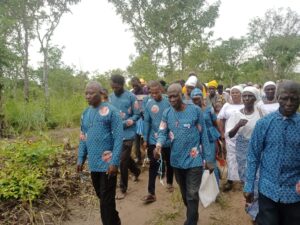
Speaking on the Church’s Liturgical Tradition, the presenter made it known to the Catechists, others, that aside from the regular Holy Masses celebrated throughout the year, the Church has Masses for ‘Special Needs’. These Masses, he said, are celebrated to pray to God for particular intentions.
According to Bishop Atuahene, Holy Masses that relate to nature and the environment and man’s labour include Masses: For the Sanctification of Human Labour, at Seedtime, after the Harvest, in Time of Famine, for Rain, and for Fine Weather; all of which are found in the Roman Missal and in the Local Translations of the Missal.
He further mentioned that these Holy Masses go alongside some blessings, including the blessing of various working tools used in working on the land and on/in water and extractive industries, and the blessing of farmlands and crops.
He added that the use of blessed water features prominently in these blessings; the sprinkling is accompanied by appropriate prayers and Psalms as an extension of the Mass. These Rites of Blessings can be found in the Book of Blessings or the local versions of the Book, he noted.
“Celebrating these Masses and blessings in the course of the year is one important way of reawakening our awareness of the spiritual dimension of creation and our relationship with God’s creation as well as the sacredness of our work on the land,” he underpinned.
He further communicated that Ghanaians in general, and Catholics in particular, are to make the above-listed Masses and Blessings part of their annual Cycle of Liturgical Ritual celebrations.
The Bishop underscored that the Masses and Blessings are handled by the Priest. He, however, noted that, where the Priest is not available, the responsibility rests on the catechist to lead the community in the Service and offer the prayers particular to the day.
He encouraged all Catholics to participate more actively in the U.N.-sponsored Day Celebrations that are created to draw awareness of the populace on various aspects of life, in addition to the Liturgical celebrations and Blessings in the liturgical books.
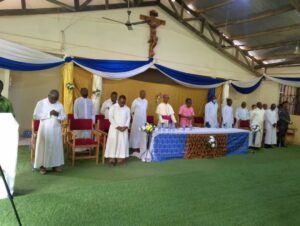
Such celebrations are:
- Arbor Day Celebration on April 25, which is a day of observance in which individuals and groups across the world are encouraged to plant trees. It could, however, be observed on other days in the year in line with the rainfall pattern (the weather).
- World Environmental Day: June 5, celebrated annually to encourage awareness and action for the protection of the environment. It is supported by many non-governmental organizations.
- Earth Day: April 22; an annual event to demonstrate support for environmental protection.
- World Water Day: March 22; an annual U.N. observance that highlights the importance of fresh water. It is a day used to advocate for the sustainable management of freshwater resources.
- World Soil Day: 5th Dec, which focuses on the importance of healthy soil.
By Sr. Sylvie Lum Cho, MSHR


